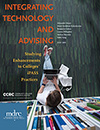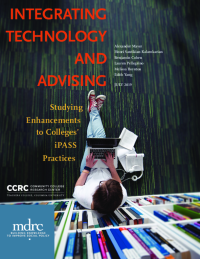Integrating Technology and Advising
Studying Enhancements to Colleges’ iPASS Practices

 Across the United States, college graduation rates for low-income students are too low. There are many contributing factors: inadequate academic preparation, the cost of college, challenges balancing work and school, difficulties that many first-generation students face navigating college, and institutional practices that may unintentionally hold students back. A key element of the programs that are most effective at helping students stay on track is frequent advising, including reaching out to students who seem to be struggling. In many cases, however, resources limit the amount of time advisers can spend with students. Employing technology to improve the staff’s ability to provide high-quality advising can be an attractive strategy for institutions looking to make system-wide changes.
Across the United States, college graduation rates for low-income students are too low. There are many contributing factors: inadequate academic preparation, the cost of college, challenges balancing work and school, difficulties that many first-generation students face navigating college, and institutional practices that may unintentionally hold students back. A key element of the programs that are most effective at helping students stay on track is frequent advising, including reaching out to students who seem to be struggling. In many cases, however, resources limit the amount of time advisers can spend with students. Employing technology to improve the staff’s ability to provide high-quality advising can be an attractive strategy for institutions looking to make system-wide changes.
Integrated Planning and Advising for Student Success (iPASS) is an initiative funded by the Bill & Melinda Gates Foundation to support colleges that seek to incorporate technology into their advising and student services. In iPASS, such technology is intended to increase advising’s emphasis on a student’s entire college experience, enabling advisers to more easily (1) intervene when students show early warning signs of academic and nonacademic challenges, (2) regularly follow up as students progress through college, (3) refer students to tutoring and other support services when needed, and (4) provide personalized guidance that reflects students’ unique needs.
To study how technology can support advising redesign, MDRC and the Community College Research Center partnered with three institutions already implementing iPASS: California State University, Fresno; Montgomery County Community College; and the University of North Carolina at Charlotte. The three institutions increased the emphasis on providing timely support, boosted their use of advising technologies, and used administrative and communication strategies to increase student contact with advisers. The enhancements at all three institutions are being evaluated using a randomized controlled trial research design.
This report shows that the enhancements generally produced only a modestly different experience for students in the program group compared with students in the control group, although at one college, the enhancements did substantially increase the number of students who had contact with an adviser. Consequently, it is not surprising that the enhancements have so far had no discernible positive effects on students’ academic performance. The findings also highlight the potential for unintended consequences. Before the study, each of the institutions had required that certain groups of students see an adviser before registering for classes in the next semester. Each institution expanded this preregistration requirement to include all students in the study’s program groups, but at one institution, the requirement appears to have contributed to a small reduction in earned credits.
Even though the enhancements have not yet produced clear improvements in students’ academic performance, in interviews, some staff members at the institutions indicated that their work in the iPASS initiative and their work on the enhancements studied here are important steps toward a stronger system to support students and help them succeed. In general, the institutions in this study have made progress in making advising technologies and data accessible to students, advisers, and faculty — and in experimenting with new strategies to use these technologies in student advising — but each also faced challenges.
It is still early, and there is much to learn about how to use technologies and advising practices to drive improvements in student outcomes. Institutional practices are changing; the next step is to build on these advances to produce larger changes in the student experience.






